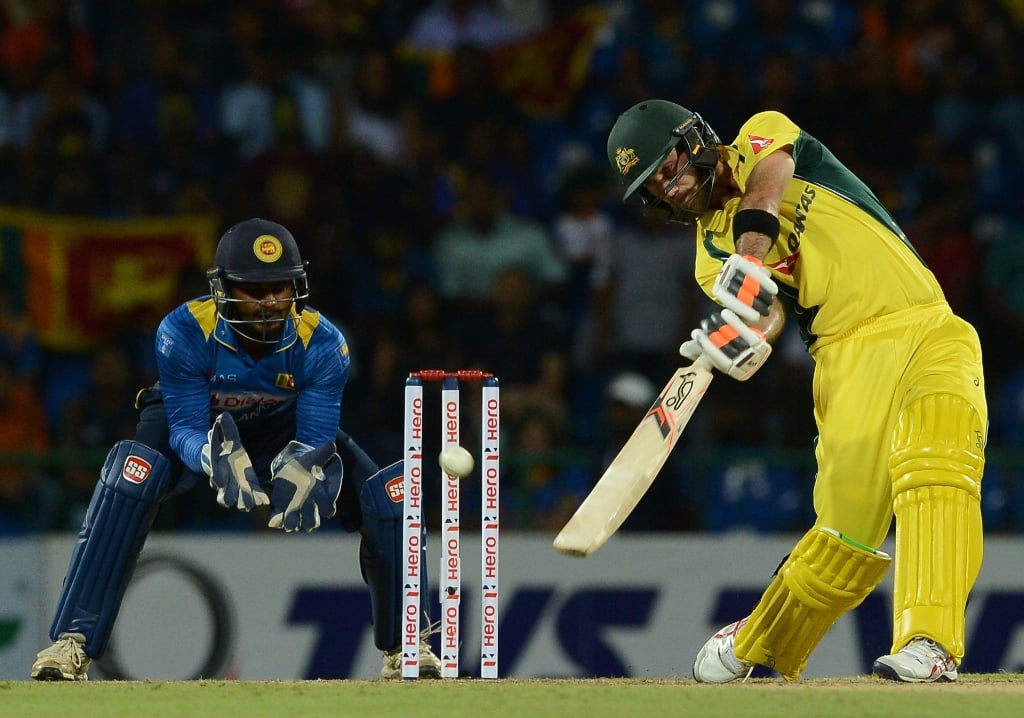
Australia cruised to victory on Tuesday in the first match of a T20I series against Sri Lanka after spanking 263 runs in their innings, breaking the previous best of 260 scored by their hosts against Kenya in 2007.
The performance came exactly a week after England posted the highest ever total in a 50-over international, scoring 444 for three against Pakistan.
The last fortnight has also seen a new record for the highest number of runs in a T20I, with India and the West Indies totalling a combined 489 runs in a match in Florida on August 27.
Maxwell determined his biggest show won’t be a sideshow
Such run-fests may be great entertainment for spectators, but some commentators say they could end up doing more harm than good.
“Bowlers are being reduced to bowling machines. It is a terribly one-sided affair, there is no contest at all,” Indian spin great Bishan Bedi told AFP. “I don’t mind being hit for a four or a six but it’s being hit so easily and consistently. The charm of true cricket has been thrown out of the window.”
In a series of tweets after Tuesday’s carnage in Sri Lanka, former India international Sanjay Manjrekar urged administrators to “respect the intelligence of fans.”
Must respect intelligence of fans. They too are evolving. They don't come to watch just 4s & 6s. Melodrama in entertainment is outdated.
— Sanjay Manjrekar (@sanjaymanjrekar) September 7, 2016
The lopsided balance between bat & ball in T20s must be monitored. Must not let it reach ridiculous proportions. https://t.co/XyYpwXJ61d
— Sanjay Manjrekar (@sanjaymanjrekar) September 7, 2016
Players past and present say much of the credit for the record-breaking trend must go to the batsmen who have endlessly raised the bar in terms of skill, inventiveness and fitness since the advent of T20 cricket at the beginning of the last decade.
9 records tumbled in third England-Pakistan ODI
Glenn Maxwell’s match-winning 145 in Pallekele came off just 65 balls and included 14 fours and nine sixes, combining textbook strokes with awesome power-hitting. England’s victory over Pakistan was founded on a similarly stunning 171 by Alex Hales, the highest score for his country in an ODI.
Like many of their modern-day counterparts and teammates, both men use much heavier bats than those wielded by previous generations, allowing them to clear the boundary with much higher frequency.
While there are limitations on bat length (when the lower portion of the handle is inserted, it cannot be more than 38in/96.5cm) and width (4.25in/10.8cm at its widest part), none currently exist on weight.
The International Cricket Council’s cricket committee recommended in June that new restrictions on the size of bats needed to be brought in, a call that is being heard ever more widely.
In a speech in July, former Australian captain Ricky Ponting said he wanted to at least see restrictions in Test cricket, predicting different rules for different formats.
Pakistan crumble before England’s record ODI total
Speaking before embarking on the tour to Sri Lanka, Australian fast-bowler Josh Hazlewood said he was in favour of some kind of restrictions.
“Some of those cricket bats going around the dressing sheds at the moment are unbelievably big,” said Hazlewood, who was rested for the T20Is.
Others say that a glut of batting-friendly pitches is the main reason for the increase in run-scoring, with Indian legend Sachin Tendulkar among those saying bowlers need more help from the groundsmen.
“In the T20 format, even the greatest of the bowlers (are) being reverse-swept. In one-days, 300 is no more a competitive total. It is a par total,” Tendulkar was quoted as saying on a recent trip to London. “You’ve got to look at changing the surfaces.”
Bedi said the myriad fielding restrictions that have been brought in over the years had all favoured the batsmen.
“All these field restrictions are just gimmicks to see the batsmen go over the top,” he said. “What we are doing is really crippling the role of a bowler. The majority of bowlers, there are exceptions of course, seem to be existing merely as bonded labour.”
















-(1)1714116455-0/Heeramandireactions-(2)-(1)1714116455-0-270x192.webp)
















1714024018-0/ModiLara-(1)1714024018-0-270x192.webp)









COMMENTS
Comments are moderated and generally will be posted if they are on-topic and not abusive.
For more information, please see our Comments FAQ